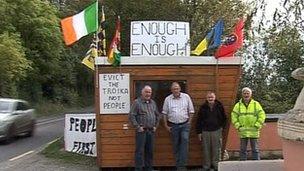Irish eviction resistance has echoes of post-famine history
- Published
In the Irish Republic some banks are moving against home-owners and farmers who are not repaying their debts. But as BBC NI's Dublin correspondent Shane Harrison reports, there is a folk memory of resistance to evictions.
As he walks along the leaf-strewn streets of Dundalk town centre towards his apartment, Eugene Dooley is always prepared for the unexpected.
A few weeks ago, he and his supporters refused to allow the local sheriff to serve an eviction notice on him.
He has a 220,000 euros mortgage for an apartment bought at the height of the boom, that is now worth just a third of that figure.
A quantity surveyor by trade, he lost his job when construction slowed and has not worked full-time since.
'Angry and embarrassed'
He says he was unable to make regular mortgage repayments, and the letters from his bank soon followed.
"I suppose that I felt angry and embarrassed that I couldn't make my payments, and I suppose I felt ashamed," he says.
"I was fearful of the correspondence I was getting from solicitors. It was all overwhelming and I buried my head in the sand."
But after a while, he says, he thought about the morality of what the bank was trying to do to him and decided with the help of supporters to stay put in his town centre apartment.
He insists he will repay all the money when his life turns around.
But his bank says home repossessions are only pursued as a last resort and Mr Dooley's case is an extreme one, because of his lack of cooperation and failure to make regular payments.
Maybe it's because of the folk memory of resistance to the 19th century land evictions in the aftermath of the Great Famine, but there is evidence of a reluctance on the part of building societies to force people from their homes.
Official figures suggest someone in Northern Ireland is 13 times more likely to face eviction for falling behind in repayments than someone in the Republic.
However, Finbar Markey, from the non-party Anti-Eviction Taskforce and who supports Eugene Dooley, is a bit sceptical about those official figures.
"If the problem is greater in Northern Ireland, then maybe there is a need for us up there; we are an all-Ireland entity," he says.
"But it's important to remember that people in the Republic are being coerced into handing in their keys.
"And as much as evictions evoke anger amongst Irish people because of our history, it also evokes a hell of a lot of fear."
At the other end of the country, near the Limerick-Kerry border, Seamus Sherlock is fighting along with his five children to stay in his family home with its 50-acre farm.
He says that as a bog-man he lost his regular income five years ago, when an EU directive banned commercial turf-cutting.
He owes his bank more than 300,000 euros, but when he was unable to make monthly payments, he was served with an eviction notice.
"When I opened the letter and saw that it was an execution order, my heart sank," he says.
"What was going to happen to my children? My mother had just died in January and I looked up to heaven and said 'Mother, how are we going to stop this'."
'Last resort'
He insists he wants to pay the money back but over a longer time period, and has offered his bank a five-figure sum as a one-off payment. However, this offer was rejected.

Local people have rallied around Seamus Sherlock in his campaign against the bank
While his bank would not comment on his specific case, it says it only seeks repossession as "a last resort".
There have been newspaper reports that he has a history of bad debts - something he strongly denies.
He says: "We live in a very modest house; we don't even have central heating but we're willing to pay our debts first.
"I've never stood up for anyone in court that wasn't willing to pay their debts.
"I never look for anything for nothing - we just need more time."
Mr Sherlock's friends and neighbours have rallied to his cause.
Two sets of barriers around his home and farm are watched 24 hours a day to stop any eviction, while local women have been bringing hot meals to him and his supporters.
One of those on duty, Coireall MacCurtain, says: "I'm here, first of all, to show solidarity with Seamus. I come every morning at 6am and stay until 7am to relieve somebody else."
Another supporter, Con Cremin, adds: "I'm here because I've known Seamus for the last five years and I know him as a genuine man.
"He's in trouble because of the bankers who aren't treating him very fairly - there's one law for the bankers and another for the ordinary people."
With banks and building societies trying to recover loans, those who borrowed and are unable to pay face a very uncertain future.
All are mindful that the echoes of history are never very far away.
- Published5 May 2012
- Published28 February 2012
- Published29 September 2011